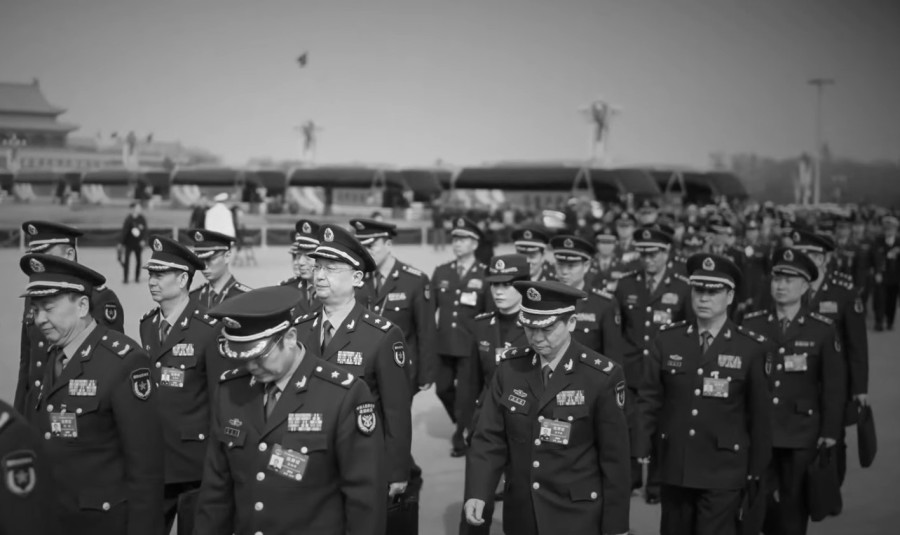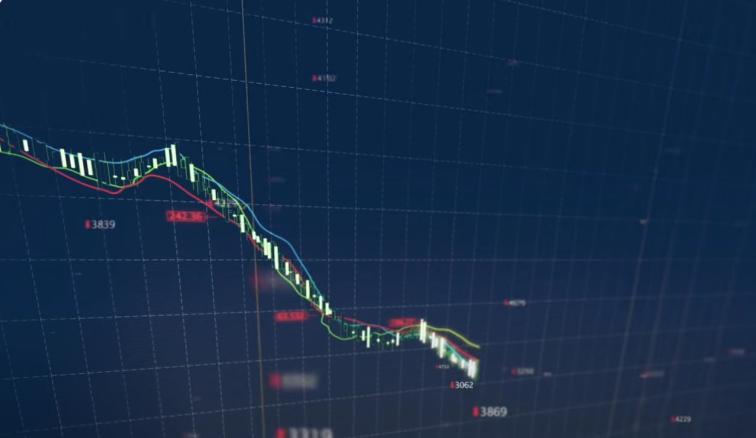The new prophecy mentions that Xi will face a rebellion from the military and local warlords. The image shows the representatives of the Chinese military attending the Two Sessions in Beijing. (Video screenshot)
[People News] In May 2025, the Xi Jinping administration announced what it claims to be the 'strictest' alcohol ban in history, leading to a rapid downturn in the national catering industry. After more than four months of enforcement, on September 2, the Shaoxing city government in Zhejiang revealed a 'consumption-boosting policy', effectively acting as a 'reverse alcohol ban'. Many commentators argue that the Chinese Communist Party (CCP) is demonstrating governance incompetence, with policies changing frequently, and the alcohol ban has exposed the CCP's various issues, indicating a loss of fundamental governance capability.
According to the Shaoxing city government, the 'consumption-boosting policy' will offer subsidies to consumers hosting banquets (with five tables or more and a minimum expenditure of 10,000 RMB) in hotels. The subsidies will be based on the hotel sales invoice, including tax, with a maximum limit of 5,000 RMB. This initiative has been humorously dubbed a 'reverse alcohol ban'.
The Shaoxing city government's decision has ignited intense discussions online: 'Holding large banquets with government subsidies, what kind of operation is this?', 'Does this policy really encourage high consumption?', 'From ICU to KTV, every turn is unexpected', 'I really don’t understand, changing policies like the weather, flipping the hand to cover the clouds, and showing no regard for credibility at all?'
The Chinese self-media influencer 'Lüjie' remarked that the new policy essentially states that if you eat enough and spend generously within a designated area, the government will provide you with financial incentives. Doesn't this sound like a 'reverse prohibition'? He noted that at the end of June this year, state media hinted that 'prohibiting violations of eating and drinking does not mean that all eating and drinking is a violation,' and emphasised that 'rectifying violations of eating and drinking is not a temporary measure and cannot be applied uniformly.' Consequently, the hotel industry suddenly faced a downturn, with star-rated hotels beginning to set up stalls. If hotel dining consumption continues to decline, chefs and waitstaff will lose their jobs, and suppliers of ingredients and wedding services will also be affected. The industrial chain is interconnected, and ultimately, it is the local economy that bears the burden. By the end of July, the news about 'Chongqing Rongchang Secretary dining out' had become a trending topic. Now, it is the local government's turn to encourage everyone to return to hotels for meals. In recent years, many local policies have been short-lived, and businesses are particularly wary of such frequent regulatory changes.
Commentator Yan Chungu (顏純鈎) expressed on Facebook that the alcohol ban has resulted in more harm than good, stating, "Xi Jinping's decision-making is flawed and his cognitive abilities are deteriorating." He highlighted that the Chinese Communist Party (CCP) is beset by numerous problems and has lost its fundamental governance capabilities. Just as social consumption is faltering, the sudden imposition of an alcohol ban, coupled with escalating restrictions from various government levels, has exacerbated the situation. While public spending on food and drink has been temporarily curtailed, the real issue is the suffocation of an already struggling consumer market. Many online small business owners are voicing their frustrations, claiming that the alcohol ban has further crushed public consumption desires, leading to a significant decline in street food vendors and stalls. In response to the backlash against the alcohol ban, the CCP quickly clarified, "Prohibiting illegal eating and drinking does not mean that all eating and drinking is illegal." The ban is not intended to rectify party conduct, as the party's integrity has long been compromised. In truth, the government is running out of funds, and if it continues to indulge in extravagant spending, everyone will be left waiting for their downfall. However, the savings from the alcohol ban are insufficient to address the financial gaps faced by local governments. This has negatively impacted public consumption desires, resulting in even lower spending, more private business closures, worsening unemployment, and increased pressure on government governance. This vicious cycle is beyond Xi Jinping's comprehension. It is clear that Xi Jinping's mental state is problematic, as his repeated decision-making errors have led the country to such a state of disrepair. The demise of a regime occurs when those in power see a boat leaking from all sides, and everyone is watching, just waiting for the day it sinks.
In an article published in The Epoch Times, commentator Xiao Yi highlights that the Chinese Communist Party (CCP) has proclaimed the implementation of the 'strictest' alcohol ban in history. While this may seem like a measure to combat the misuse of public funds and extravagance, it is, in fact, a political manoeuvre. Under the intense pressure from the authorities and the increasing measures imposed by local governments, this ban has transformed into a comprehensive control mechanism over personnel within the system. The management of civil servants' work, dining, and social activities has been included, extending its reach to non-system groups, which has further exacerbated the already fragile state of the Chinese economy and local finances.
The article contends that this alcohol ban crisis has expanded from anti-corruption efforts to social control, and from the rectification of public service to economic regulation, revealing the critical flaws in the CCP's governance model of 'party controls everything.' Ultimately, the authorities may find themselves in a difficult position; if they continue to enforce the ban with high pressure, the economy could collapse, and the morale within the system may further decline. Conversely, if they decide to retract the alcohol ban, it would be perceived as a policy failure and a concession by the central government, undermining their authority. The authorities have effectively created a trap for themselves. △











News magazine bootstrap themes!
I like this themes, fast loading and look profesional
Thank you Carlos!
You're welcome!
Please support me with give positive rating!
Yes Sure!